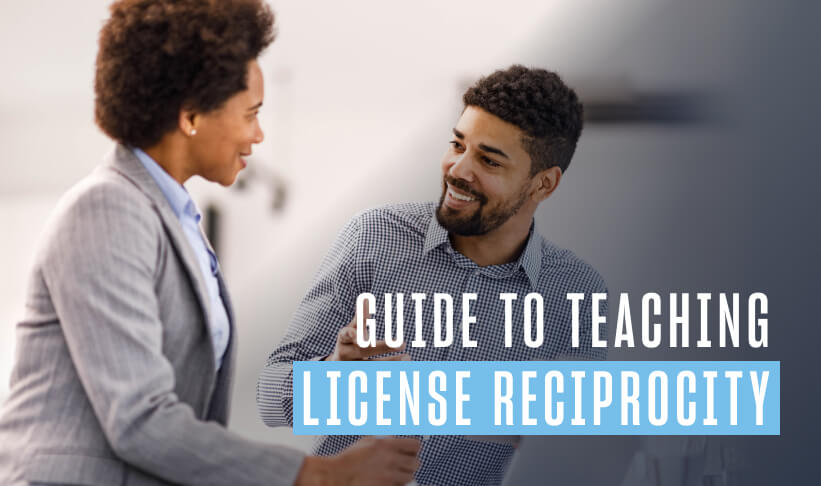The demand for teachers has never been greater, with many school districts experiencing staff shortages and a lack of job applicants. Part of their challenge comes with filling these positions with qualified and skilled professionals.
To provide that quality, aspiring teachers need more than experience, education and a passion for teaching — if they want to teach at the K-12 level, they need to be certified and credentialed. Read on for more details about licensing and credentials, including online certification programs, how certification differs from teaching degrees and how you can prepare to earn your own teacher certification.
What Is a Teaching Certification Program?
Teacher certification is the process by which prospective educators obtain a credential or certification that confirms their qualification and competence to teach within a given area. This process is sometimes called licensing, though licensure specifically refers to the legal authority granted by a state or governing body for someone to teach within a specific jurisdiction.
This license is conferred to teachers who have completed certain state-mandated requirements, including:
- Obtaining an appropriate level of education
- Accumulating a set amount of student teaching experience
- Having taken and passed state-mandated teaching examinations
- Meeting other specified criteria such as passing a background check
A teaching certification program, also known as a teacher education program or teacher preparation program, is a structured educational program designed to provide prospective teachers with the necessary coursework, field experience, training and guidance to apply for a teaching license or certification. These programs ensure that you:
- Meet the mandated state or regional standards for certified teachers
- Have all the materials required to meet all specified criteria
- Are up to speed on accepted teaching methods
Public school teachers in all fifty states must have a valid teaching license, and many states also require that teachers have an accredited degree by the Council for the Accreditation of Educator Preparation (CAEP). While private schools generally don’t require certification, they may prefer to hire educators who are licensed and/or certified.
Teaching certification programs can be taken either in-person or online. Online teaching certification programs offer the same instruction and coaching as in-person programs, and many states will accept certification from partially or fully online programs. Eligibility for licensure varies by state, so be sure to check with your state’s board of education for full details on their certification requirements.
Online Teaching Certification Program vs. Teaching Degree
Despite sounding very similar, there are important differences between an online teaching certificate program and online teaching degree programs.
Teaching degrees — Whether administered online or in-person, teaching degree programs are the traditional path toward teacher certification. They can be undergraduate or graduate programs, with graduate degree programs providing students specialized training in a particular area of study.
These programs include general education credits and do not, in themselves, provide a license to teach. The average cost of a teaching degree program in the U.S. can range from around $10,000 to $50,000 per year for tuition and fees. A bachelor’s degree program requires anywhere from 120 to 150 credit hours to complete, while a master’s degree program will require around 30 to 45 credit hours of coursework.
Certification programs — Online teaching licensure programs train students on fundamental elements such as how to prepare and deliver lesson plans and how to present information at different educational levels. These shorter and more streamlined programs are designed to help students meet state certification requirements and are well-suited for those who have a bachelor’s degree that’s not in education, but still hope to obtain their online teaching credentials.
Online teacher licensure programs can cost between $10,000 to $30,000 and usually require the fulfillment of 30 credit hours. Most programs can be completed within two years even with a part-time schedule. These programs do not confer a degree.
Earning a teaching degree is a far more rigorous and comprehensive experience, making it an important step for anyone interested in different careers in education. Teaching certification programs are extremely helpful in gaining the skills and experience needed to earn the license and credential required for teaching.
Why Take a Teaching Certification Program?
The traditional route of earning a certification requires that you:
- Earn a bachelor’s degree in education -or-
Complete a licensing master’s degree if you have a non-education bachelor’s degree - Fulfill the in-classroom teaching requirement
- Pass a background check
- Pass your state’s required exam(s) for teachers
- Apply for your teacher certification through your state’s Department of Education
Any of these steps can be completed online — except for the teaching requirement. Prospective teachers are often required to complete a set amount of hours of classroom teaching as part of their teaching credential programs. Teaching certification programs will often offer support, resources and even placement within a class to help you complete the teaching requirements — which can be a huge hurdle in earning your certification.
It’s important to understand that you will always need at least a bachelor’s degree to be certified to teach, though it does not need to be a degree in education. There are alternative certification programs for those with undergraduate degrees in non-education fields looking to transfer into teaching. This particular approach is gaining popularity, as the Center for American Progress found that enrollment in for-profit alternative teacher-certification programs grew by 283 percent from 2010-11 to 2018-19.
A few other notes:
- Certifications will need to be renewed periodically, usually after three to five years
- Earning a master’s degree does not guarantee licensure, but many master’s degree programs are designed to qualify you for licensure and better prepare you to teach in a specialty field
- Some programs culminate in students taking state board exams to gain their teaching license online
- There are other means of earning a certificate aside from going through a certification program and passing an exam, though they’re very situational and may carry certain conditions:
- Emergency teaching credentials may be issued by states with severe teacher shortages
- Transition to Teaching programs assume that teaching candidates already have content knowledge in a licensing area and hold a bachelor’s degree from an accredited higher educational institution
- Private schools will often accept applicants with demonstrated career experience and technical education certification in specific subject area
Online Teaching Certification Options
In most states, to get alternative certification as a teacher, all you need is a bachelor’s level education and a passing score on a set of state-specific teaching requirements. However, not all certifications are the same. Here’s what you need to know about the different types of teaching certification:
Though categories of licenses will vary by state, three of the most common kinds of certifications are:
- Temporary or provisional, which is nonrenewable and valid only for a short period.
- Initial, which is required for professional licensure, is often valid for up to five years and can be renewed only a limited number of times.
- Professional, which is valid for five years and can be continually renewed.
There are also grade-specific specializations:
- Elementary Education (K-6)
- Middle School (6-8)
- Junior High School (7-9)
- High School (9-12)
- All Grade Levels (K-12)
Elementary education degrees allow for teaching multiple subjects, while middle and high school degrees will require you to pick a topic or two for your teaching area. You can choose to specialize in academic subject areas, including:
- Math
- Biology
- Chemistry
- Earth Science
- Physics
- English
There are special degree concentration for working with specific populations:
- Special Education is for working with children with special needs who have specific cognitive, physical or emotional learning difficulties.
- English Second Language or English Language Learning is for teaching English to non-native speakers.
- There is also a Special Education and Elementary Education Dual License for working with non-native English speakers with special needs.
The exact number of possible options depends on available specialization and disciplines. For example, the National Board for Professional Teaching Standards (NBPTS) — a nonpartisan, nonprofit organization that provides one of the most highly established certifications in education — lists 25 areas of certification structured around 16 different disciplines and six student developmental levels.
Benefits of Online Teaching Certification Programs
While the effectiveness and quality of online teaching certification programs vary depending on the institution and program, they do have certain unique benefits:
- The focused nature of certification programs mean they will often cost less than traditional bachelor’s or master’s degree programs.
- The online structure provides a convenient and flexible schedule as well as a greater degree of accessibility.
- They’re structured to offer a variety of multimedia resources for learning, including videos, interactive modules, online libraries and virtual simulations.
- Many are accredited academic institutions that are recognized by multiple states.
- Some online teaching degree programs also help students arrange their in-person teaching hours with the schools in their vicinity
Are Online Teaching Certification Programs Worth It?
If you’re hoping to become a teacher, then an online teacher certificate program is a helpful and convenient way to earn your teaching certificate. However, consider your choice of program carefully. According to a 2021 study by the University of Texas at Austin’s College of Education, teachers who completed university-based teacher-prep programs had a 24 percent higher retention rate than those who went through alternate-route programs.
The University of San Diego’s online Master of Education program is designed for experienced educators who seek to become designers of learning and enhance their skills. Our program requires that students have two years of teaching experience. As a result, most students already have a teaching credential or they work in roles that do not require a teaching credential. Though USD’s Master of Education program does not grant licensure, it will give teachers ideal preparation to earn their license.
The specializations offered through our Master of Education degree program provide a strong researched-based curricular foundation with immediate practical classroom applications. Specializations include: Technology and innovation, STEAM, inclusive learning, curriculum and instruction and school leadership.




